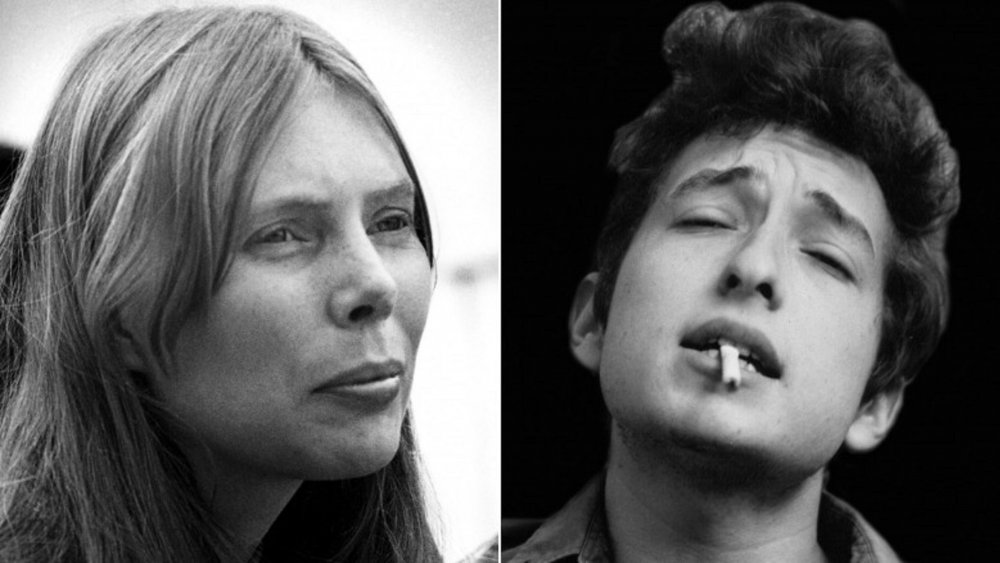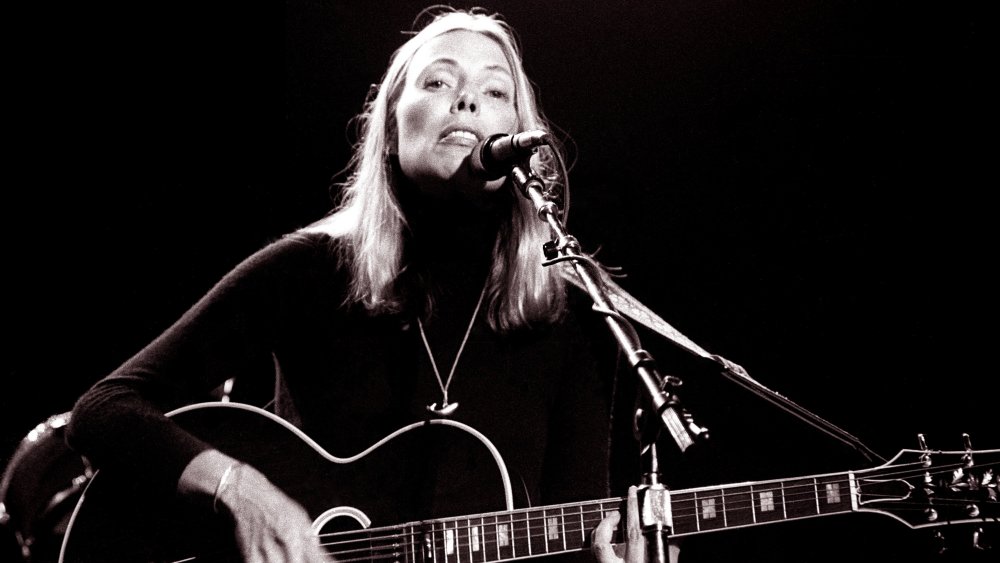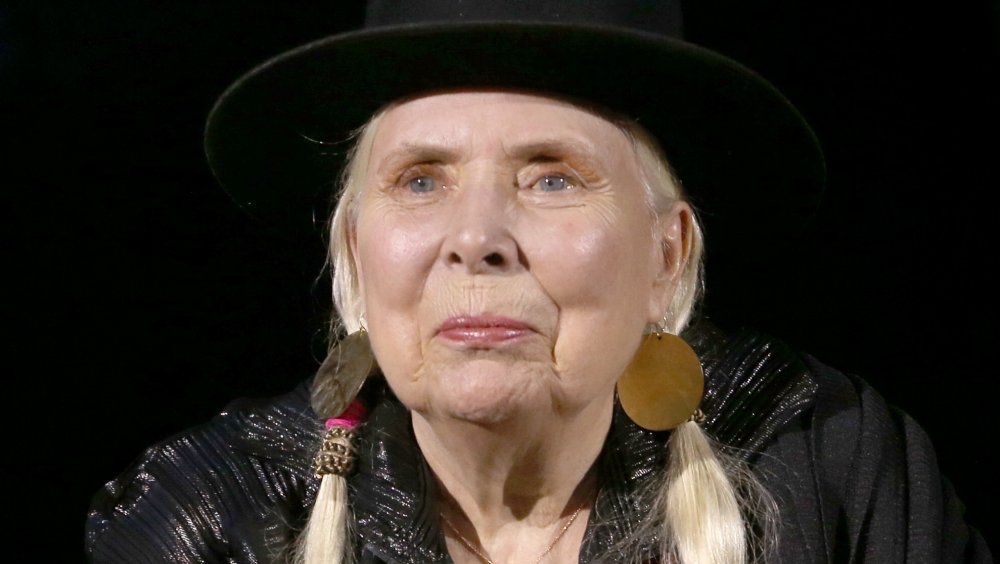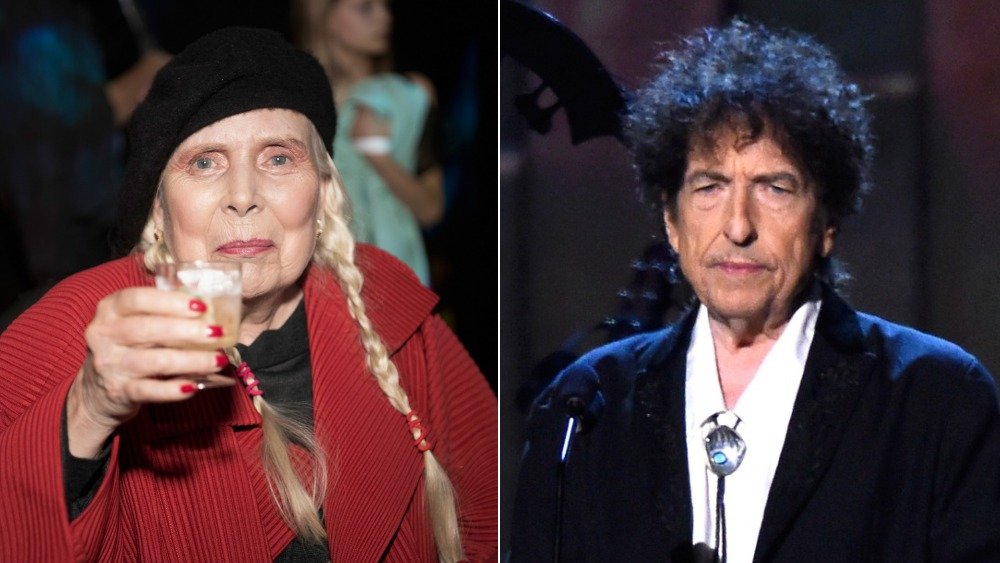Inside Joni Mitchell And Bob Dylan's Tense Relationship
Considering they're both among the greatest voices of a generation, it's no surprise that Joni Mitchell and Bob Dylan aren't the type to mince words — even when those words happen to be barbs directed from one person to the other. The "River" crooner has lambasted Dylan in interviews over the years. During a 2010 roundtable discussion with the Los Angeles Times, she referred to him as a "fake," a "plagiarist" and more.
What does Mitchell have against "Mr. Tambourine Man" himself? The vitriol might have to do with the frustration of being compared to her male folk counterpart in the first place. Let's take a closer look at this somewhat odd relationship between music legends.
Joni Mitchell once called Bob Dylan a 'plagiarist'
News of Joni Mitchell's less-than-favorable opinion of Bob Dylan first made headlines in 2010, during an interview alongside infamous Joni Mitchell-inspired drag performer John Kelly. During that roundtable discussion, Mitchell made it perfectly clear that she did not appreciate the interviewer comparing her to fellow folk artist Bob Dylan.
During a segment of the conversation with Los Angeles Times reporter Matt Diehlin, the three discussed the chimeric ideal of the on-stage persona. Diehl reflected upon how Mitchell, who was born Roberta Joan Anderson in 1943, had changed her name — much like how "someone named Bobby Zimmerman became Bob Dylan." While the comment was most likely meant to be an inconspicuous comparison made in passing, Mitchell seemed to take offense immediately.
"Bob is not authentic at all," she said. "He's a plagiarist, and his name and voice are fake. Everything about Bob is a deception. We are like night and day, he and I." Mitchell then quickly moved on to another topic, with no other explanation as to how or why she had come to her conclusions.
Joni Mitchell's commentary didn't end there
Three years after her 2010 interview with the Los Angeles Times, Joni Mitchell once again brought up the topic of Bob Dylan in a CBC television segment. While Mitchell seemed to backtrack a bit on her aforementioned plagiarism allegation against Dylan, declining to cite specific examples, she made it clear that her opinion of Dylan's musicianship and balladeering was less-than-stellar.
"I like a lot of Bob's songs," Mitchell said, though she quickly followed up her appraisal with a less generous one: "musically, he's not very gifted." She claimed Dylan "borrowed his voice from old hillbillies" — most likely a somewhat wince-inducing reference to the influence folk singer Woody Guthrie had on Dylan's earlier work and singing style. "He's got a lot of borrowed things," Mitchell said. "He's invented a character to deliver his songs."
Her last assessment isn't entirely wrong. Throughout his career, Dylan has gone through a number of musical phases, which some could even typify as "personas." One only has to look at his discography to see that among these include that of a protest songwriter, a country music star, a born-again Christian, and many more. However, one could also argue that most artists evolve and transform their styles over time.
Did Joni Mitchell's feud with Bob Dylan start decades ago?
What caused Joni Mitchell's general dislike of Bob Dylan in the first place? The answer might be a little more complex than a simple case of musical rivalry between folk icons. It's entirely feasible Mitchell and Dylan's dynamic stems from something more personal. They toured together during Dylan's 1975 Rolling Thunder Revue — and if Cameron Crowe's 2000 film Almost Famous has taught us anything about musicians touring in the 70s, it's that things can spiral out of control at the drop of a hat. Of course, that's pure speculation at best.
There's another, more complex issue that could be at work here: the power differentials between male and female musicians. In 2017, The Ringer critic Lindsay Zoladz ruminated on "Mitchell's singular, ever-changing legacy, in the always-fickle light of right now." Zoladz claims Mitchell has always had to fight for her position among overwhelmingly male counterparts — such as Bob Dylan. Even Mitchell's mere assertion of her genius has been met with backlash, Zoladz writes, arguing that when male musicians do the same, they are met with acceptance and praise.
Zoladz went as far as to ask this: "Why is Joni Mitchell the token female musician that even the most macho rock guys are comfortable calling 'great'?" While we can hardly say for certain that Mitchell's opinion of Dylan might be informed by these dynamics, it's also reasonable to ask how it couldn't be.




